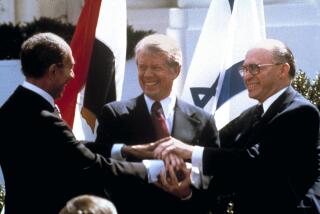U.S., Saudis Near Pact to Shift GIs to Remote Base
- Share via
WASHINGTON — The United States and Saudi Arabia are close to an agreement in principle to move many American troops from Dhahran and Riyadh to a remote air base in the desert where they will be cut off from security threats, according to senior Pentagon and Saudi officials.
The major obstacle is determining who will pay for expanding housing and other facilities at the unfinished Al Kharj air base. The Clinton administration wants the Saudi government to foot most of the bill. A final decision is expected this month.
A Saudi official, who briefed reporters on condition that he not be identified, said Monday that the kingdom had agreed “in principle” to a move and is prepared to assist, although he did not specify the extent of the aid. “It makes more sense” to transfer the Americans to secure facilities away from urban areas, he conceded.
The move is planned as administration and Saudi officials try to quell the furor over their handling of base security in the months between a bomb blast in November that killed five Americans and two Indians at a national guard facility in Riyadh run by U.S. military trainers and a June 25 truck bomb that killed 19 American airmen at a Dhahran military compound.
Al Kharj is a sprawling base about 50 miles southeast of Riyadh, the Saudi capital, originally designed just for Saudi troops. It was described by a senior Pentagon official Monday as “in the middle of nowhere, which is attractive because it would be so easy to provide security.”
Al Kharj is big enough to accommodate all the American troops as well as the Saudis it was originally intended to house. Nearly 5,000 American troops are stationed in Saudi Arabia, with more than 4,000 of them in Dhahran and Riyadh. But not all U.S. service personnel necessarily would be deployed to Al Kharj, said the Pentagon official, who spoke on condition of anonymity.
The Pentagon has been exploring the cost and feasibility of several possibilities since the November explosion in Riyadh. One early option included spreading troops out in the eastern part of the country--a move that might enhance security but could also complicate some military and support operations.
But after the second bomb went off in the kingdom’s eastern oil center, U.S. officials looked for alternatives that would get most American troops out of the major Saudi cities altogether.
“We are not planning a reduction in forces,” Defense Secretary William J. Perry said during the trip home from his Fourth of July celebration with American troops in Bosnia-Herzegovina. “We’re not going to cut and run from Saudi Arabia. But we will intensify the consideration of moving some of the forces out of urban areas. We have been looking at establishing a base south of Riyadh.”
*
The U.S. mission in Saudi Arabia will come under scrutiny today when the Senate Intelligence and Armed Services committees open hearings on the bombings. House Speaker Newt Gingrich (R-Ga.) said Monday that various congressional investigations would determine whether the administration “knew in advance of the danger.”
The White House “is systematically underestimating how dangerous the world can be,” Gingrich said at a breakfast in Smyrna, Ga.
The circumstances under which the June bombing took place are also still in dispute between Washington and Riyadh.
Pentagon officials said that in high-level talks Monday among Perry, President Clinton, Vice President Al Gore and Saudi Ambassador Prince Bandar ibn Sultan, Saudi officials claimed they were never approached by U.S. officials on critical issues, including a proposal to provide a bigger security perimeter around the buildings that housed U.S. troops at Dhahran and interviewing the terrorists who confessed to carrying out the November bombing.
U.S. officials have complained that the Saudis refused to allow them to expand the perimeter protecting the apartment compound that housed nearly 2,500 troops. And FBI investigators who traveled to the kingdom said they were rebuffed in attempts to talk with the Riyadh attack’s confessed bombers, who were then beheaded.
One issue, however, has been resolved. Bandar informed the administration Monday that the United States will be allowed to fly its flag in Saudi Arabia--a long-standing bone of contention underscored when American flags flew half-staff around the world except in the country where the June bomb went off.
Foreign flags have not been allowed to fly over Saudi soil.
More to Read
Sign up for Essential California
The most important California stories and recommendations in your inbox every morning.
You may occasionally receive promotional content from the Los Angeles Times.













